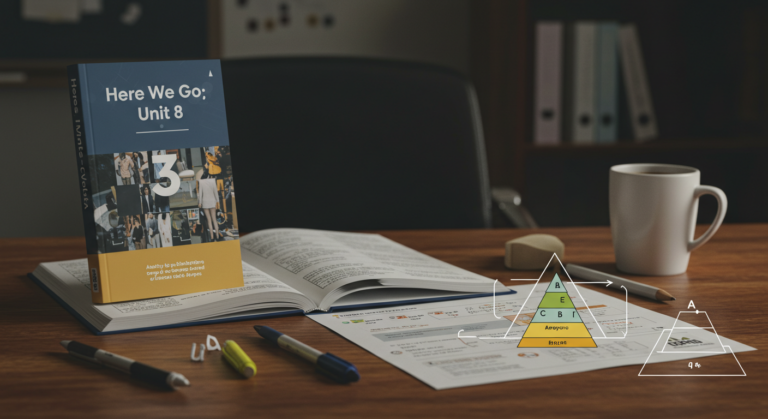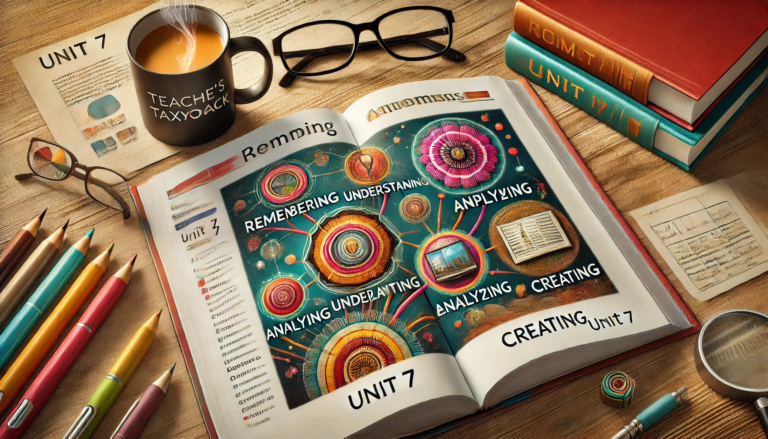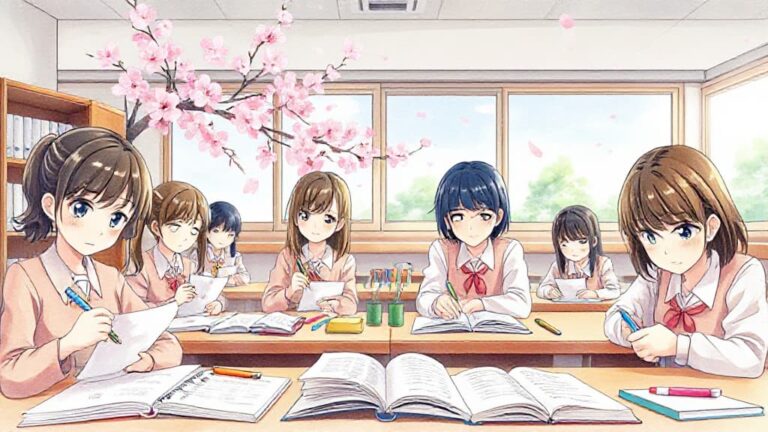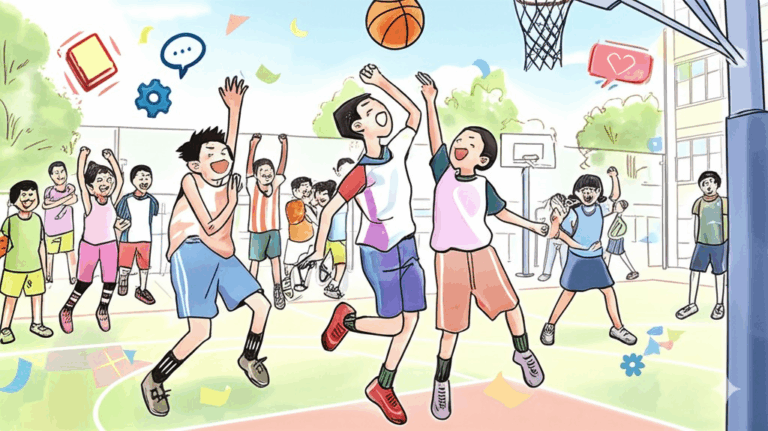Here We Go 2 Unit 1 Study Guide – “Hajin’s Diary”
このユニットで学ぶこと
What You’ll Learn in This Unit
- 日記や過去の出来事について話せる。
I can talk about diaries and past events. - 過去のある時点に何をしていたか言える。
I can say what someone was doing at a certain time in the past. - 相手に何かを頼める。
I can ask someone to do something. - 驚きや光栄な気持ちを表せる。
I can express surprise and honor.
重要単語
Key Vocabulary
時間
Time
- today×意味:
今日。
文法:
- 名詞です。
- 時間を表す言葉です。
例:
I have a meeting today.
今日、会議があります。
Today is a special day for celebration.
今日は祝賀のための特別な日です。 - yesterday×意味:
昨日。
文法:
- 名詞です。
- 時間を表す言葉です。
例:
I went to the park yesterday.
昨日、公園に行きました。
Yesterday was much colder than today.
昨日は今日よりもずっと寒かったです。 - evening×意味:
夕方、晩。
文法:
- 名詞です。
- 時間を表す言葉です。
例:
I usually read a book in the evening.
私はたいてい夕方に本を読みます。
We watched the sunset in the evening.
私たちは夕方に日没を見ました。 - in the afternoon×意味:
午後、昼過ぎ。
文法:
- 'in the' + 'afternoon' で「午後に」という意味になります。
- 時間を表す言葉です。
例:
I have an appointment in the afternoon.
午後に予約があります。
The temperature often rises in the afternoon.
午後は気温が上がることが多いです。 - in the morning×意味:
午前中、朝。
文法:
- 'in the' + 'morning' で「午前に」「朝に」という意味になります。
- 時間を表す言葉です。
例:
I drink coffee in the morning.
私は朝にコーヒーを飲みます。
The air is usually fresh in the morning.
朝の空気はたいてい新鮮です。 - last night×意味:
昨夜、昨晩。
文法:
- 'last'(最後の)+ 'night'(夜)で「昨夜」という意味になります。
- 時間を表す言葉です。
例:
I watched a movie last night.
私は昨夜、映画を見ました。
There was a thunderstorm last night.
昨夜は雷雨がありました。
場所
Places
- Busan×意味:
釜山(プサン)。韓国の都市。
文法:
- 固有名詞です。
例:
I visited Busan last year.
昨年、釜山を訪れました。
Busan is known for its beautiful beaches.
釜山は美しいビーチで知られています。 - Seoul×意味:
ソウル。韓国の首都。
文法:
- 固有名詞です。
例:
Seoul is a very big city.
ソウルはとても大きな都市です。
Seoul is the capital of South Korea.
ソウルは韓国の首都です。 - library×意味:
図書館。
文法:
- 名詞です。
例:
I go to the library to study.
私は勉強するために図書館に行きます。
The library has a large collection of books.
その図書館にはたくさんの蔵書があります。 - pool×意味:
プール。
文法:
- 名詞です。
例:
I swim in the pool every week.
私は毎週プールで泳ぎます。
The swimming pool is open to the public.
そのプールは一般公開されています。 - aquarium×意味:
水族館。
文法:
- 名詞です。
例:
I saw many fish at the aquarium.
水族館でたくさんの魚を見ました。
The aquarium is a popular tourist attraction.
その水族館は人気の観光名所です。 - Yokohama×意味:
横浜。日本の都市。
文法:
- 固有名詞です。
例:
I live near Yokohama.
私は横浜の近くに住んでいます。
Yokohama is a port city in Japan.
横浜は日本の港町です。 - Mt. Rokko×意味:
六甲山。
文法:
- 固有名詞です。
例:
We hiked up Mt. Rokko.
私たちは六甲山に登りました。
Mt. Rokko offers beautiful views of the city.
六甲山からは街の美しい景色が見えます。 - Okinawa×意味:
沖縄。日本の県。
文法:
- 固有名詞です。
例:
I want to go to Okinawa.
沖縄に行きたいです。
Okinawa is known for its unique culture.
沖縄は独特の文化で知られています。
行動
Actions
- study×意味:
勉強する。
文法:
- 動詞です。
例:
I study English every day.
私は毎日英語を勉強します。
It's important to study hard for the exam.
試験のために一生懸命勉強することが重要です。 - coach×意味:
指導する。
文法:
- 動詞です。
例:
She coaches a soccer team.
彼女はサッカーチームを指導しています。
A good coach can help athletes improve.
良いコーチは、アスリートの向上を助けることができます。 - practice×意味:
練習する。
文法:
- 動詞です。
例:
I practice playing the piano every day.
私は毎日ピアノを弾く練習をします。
Practice is essential for improving skills.
スキル向上のためには練習が不可欠です。 - look for×意味:
探す。
文法:
- 'look' + 'for' で「~を探す」という意味になります。
例:
I'm looking for my keys.
私は鍵を探しています。
She's looking for a new job.
彼女は新しい仕事を探しています。 - read×意味:
読む。
文法:
- 動詞です。
例:
I like to read books.
私は本を読むのが好きです。
Reading is a good way to learn new things.
読書は新しいことを学ぶ良い方法です。 - ride×意味:
乗る。(乗り物に)
文法:
- 動詞です。
例:
I ride my bike to school.
私は自転車に乗って学校に行きます。
He learned to ride a horse.
彼は馬に乗ることを覚えました。 - go×意味:
行く。
文法:
- 動詞です。
例:
I go to school every day.
私は毎日学校に行きます。
Let's go to the park.
公園に行きましょう。 - come×意味:
来る。
文法:
- 動詞です。
例:
Please come to my house.
私の家に来てください。
My friend is coming to visit me.
友達が私を訪ねてきます。 - eat×意味:
食べる。
文法:
- 動詞です。
例:
I eat breakfast every morning.
私は毎朝朝食を食べます。
Let's eat lunch together.
一緒に昼食を食べましょう。 - talk×意味:
話す。
文法:
- 動詞です。
例:
I like to talk with my friends.
私は友達と話すのが好きです。
Can you talk a little slower, please?
もう少しゆっくり話してもらえますか? - listen×意味:
聞く。
文法:
- 動詞です。
例:
I like to listen to music.
私は音楽を聴くのが好きです。
Please listen carefully to the instructions.
指示を注意深く聞いてください。 - write×意味:
書く。
文法:
- 動詞です。
例:
I write in my diary every day.
私は毎日日記を書きます。
Please write your name here.
ここにあなたの名前を書いてください。 - watch×意味:
見る。(テレビ、映画などを)
文法:
- 動詞です。
例:
I like to watch movies.
私は映画を見るのが好きです。
Let's watch TV tonight.
今夜テレビを見ましょう。 - play×意味:
遊ぶ。
文法:
- 動詞です。
例:
I like to play games.
私はゲームをするのが好きです。
Let's play soccer.
サッカーをしましょう。
気持ち
Feelings
- awesome×意味:
素晴らしい、すごい。
文法:
- 形容詞です。
例:
That's an awesome idea!
それは素晴らしいアイデアですね!
The fireworks show was awesome.
花火大会はすごかったです。 - excited×意味:
わくわくした、興奮した。
文法:
- 形容詞です。
例:
I'm excited about the trip.
私は旅行にわくわくしています。
The children were excited to see Santa Claus.
子供たちはサンタクロースに会えることに興奮していました。 - surprised×意味:
驚いた。
文法:
- 形容詞です。
例:
I was surprised by the news.
私はそのニュースに驚きました。
She was surprised to see him.
彼女は彼に会って驚きました。 - fantastic×意味:
素晴らしい、素敵な。
文法:
- 形容詞です。
例:
That's a fantastic idea!
それは素晴らしいアイデアですね!
The view from the mountain was fantastic.
山からの景色は素晴らしかったです。 - interesting×意味:
面白い、興味深い。
文法:
- 形容詞です。
例:
That's an interesting story.
それは面白い話ですね。
I find history very interesting.
私は歴史をとても面白いと思います。 - nice×意味:
良い、素敵な。
文法:- 形容詞です。
例:
Have a nice day.
良い一日を。
She's a nice person.
彼女は良い人です。 - great×意味:
素晴らしい、すごい。
文法:
- 形容詞です。
例:
That's great news!
それは素晴らしいニュースですね!
You did a great job.
よくできました。 - scary×意味:
怖い。
文法:
- 形容詞です。
例:
That movie was scary.
あの映画は怖かったです。
I'm scared of spiders.
私はクモが怖いです。 - beautiful×意味:
美しい、きれいな。
文法:
- 形容詞です。
例:
She is a beautiful woman.
彼女は美しい女性です。
The flowers are very beautiful.
花はとてもきれいです。 - honored×意味:
光栄な、名誉な。
文法:
- 形容詞です。
例:
I'm honored to be here.
ここに来られて光栄です。
It's an honored tradition.
それは名誉ある伝統です。 - angry×意味:
怒った。
文法:
- 形容詞です。
例:
He was angry with me.
彼は私に怒っていました。
I was angry about the mistake.
私はその間違いに腹を立てました。 - nervous×意味:
緊張した、神経質な。
文法:
- 形容詞です。
例:
I'm nervous about the exam.
私は試験に緊張しています。
She was nervous before the presentation.
彼女はプレゼンテーションの前に緊張していました。 - tired×意味:
疲れた。
文法:
- 形容詞です。
例:
I'm tired after a long day.
長い一日の後で疲れました。
She was tired from working.
彼女は仕事で疲れていました。 - sad×意味:
悲しい。
文法:
- 形容詞です。
例:
I'm sad to hear the news.
そのニュースを聞いて悲しいです。
She was sad because her friend moved away.
彼女は友達が引っ越したので悲しかったです。
知っておくべき文法
Grammar You Need to Know
動詞の過去形
Past Tense of Verbs
基本パターン:動詞 + ed (規則動詞) 、不規則動詞は形が変わる
いつ使うか:過去に起こったことや終わったことを言うときに使う。日記や昔の出来事を話すときに使う。
例文:
- I watched TV yesterday.
- I did not watch TV yesterday.
過去進行形
Past Continuous Tense
基本パターン:was / were + 動詞 + ing
いつ使うか:過去のある時点に何をしている最中だったかを言うときに使う。過去のある瞬間の状況を説明するときに使う。
- I, he, she, it のときは was を使う。you, we, they のときは were を使う。
例文:
- I was studying English.
- I was not studying English.
- 短縮形:was not = wasn’t, were not = weren’t
練習会話
Practice Conversations
会話 1: 春休みについて
Conversation 1: About Spring Vacation
A: How was your spring vacation?
B: It was great! I went to Kyoto.
A: Kyoto! Nice. What did you do there?
B: I took many pictures with my friends.
会話 2: 何をしていたの?
Conversation 2: What were you doing?
A: Hi, Hajin. What were you doing at the library earlier?
B: Oh, hi Eri. I was studying for the English test. How about you?
A: I was playing basketball with Kota.
B: Sounds fun!
会話 3: 手伝ってくれませんか?
Conversation 3: Can you help me?
A: Excuse me, can you help me with this question?
B: Sure. What’s wrong?
A: I don’t understand this word.
B: Let’s see… Ah, it means “excited.”
力試し!
Test Yourself!
- 春休みについて話せますか。
Can you talk about your spring vacation? - 昨日の夕方に何をしていたか人に聞けますか。
Can you ask someone what they were doing yesterday evening? - 週末について短い日記を書けますか。
Can you write a short diary entry about your weekend? - 動詞の過去形を正しく使えますか。
Can you use past tense verbs correctly? - 過去進行形を正しく使えますか。
Can you use past continuous tense correctly? - 人に助けを求められますか。
Can you ask someone to help you?
学習チェックリスト
My Learning Checklist
- [ ] 春休みについて簡単に話せる
I can talk simply about my spring vacation. - [ ] 日記で過去の出来事を書ける
I can write about past events in a diary. - [ ] 動詞の過去形を使って文を作れる
I can make sentences using the past tense of verbs. - [ ] 過去進行形を使って文を作れる
I can make sentences using the past continuous tense. - [ ] 友達に過去の出来事について質問できる
I can ask my friends about past events. - [ ] 困っている友達に助けを申し出られる
I can offer help to a friend who is having trouble. - [ ] 先生に質問できる
I can ask the teacher questions.






